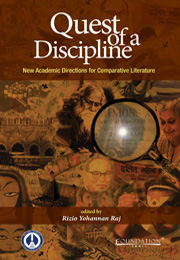Book contents
- Frontmatter
- Contents
- List of Contributors
- Acknowledgements
- Prologue to the “Quest'
- Introduction
- PART I Traditions and Manifestoes: Reflecting on Perspectives
- PART II The Quest Motif: Redefining the Scope of Comparative Literature
- 4 Beyond ‘Other Words’: The ‘Relevance’ of Translatology as Comparative Literature
- 5 Intertextual Lores and the Play of Language: Folklore/Orality in the Comparative Context of Literature
- 6 Towards a Comparative Performance Studies
- 7 Media Studies and the Academic Elite
- 8 Comparative Film Studies: The Culture Studies Turn in Comparative Literature
- 9 Finding Space in the Margin: Teaching Women's Literature in a Comparative Perspective
- PART III The Dynamics of Exchange: Genres, Areas and Disciplines
- PART IV India: A Curious Comparative Space
- Afterword: Comparative? Literature?
- Index
7 - Media Studies and the Academic Elite
from PART II - The Quest Motif: Redefining the Scope of Comparative Literature
Published online by Cambridge University Press: 05 June 2012
- Frontmatter
- Contents
- List of Contributors
- Acknowledgements
- Prologue to the “Quest'
- Introduction
- PART I Traditions and Manifestoes: Reflecting on Perspectives
- PART II The Quest Motif: Redefining the Scope of Comparative Literature
- 4 Beyond ‘Other Words’: The ‘Relevance’ of Translatology as Comparative Literature
- 5 Intertextual Lores and the Play of Language: Folklore/Orality in the Comparative Context of Literature
- 6 Towards a Comparative Performance Studies
- 7 Media Studies and the Academic Elite
- 8 Comparative Film Studies: The Culture Studies Turn in Comparative Literature
- 9 Finding Space in the Margin: Teaching Women's Literature in a Comparative Perspective
- PART III The Dynamics of Exchange: Genres, Areas and Disciplines
- PART IV India: A Curious Comparative Space
- Afterword: Comparative? Literature?
- Index
Summary
INTRODUCTION
American actor and recent Academy Award co-host, James Franco, has in the past two years been arguably one of the most productive people of celebrity on the planet. Just a brief mention of a few of his project of late: he has finished two MFA writing programs at NYU and Columbia University; conducted a video interview of Marina Abramovic for the Wall Street Journal in which he is seen with the artist wearing matching lab coats, peeling almonds, and eating gold; appeared and is set to re-appear on US soap opera General Hospital playing a character ‘Franco’, a psychotic artist wherein his last episode he escapes Jason and Dante at a giant art show by publicly faking his death; has made an installation piece for New York's Deitch Projects based on his General Hospital stint; he is currently pursuing a PhD in Yale's English department at the behest of Harold Bloom and is about to work on a degree at the Rhode Island School of Design.
A Divided Mission?
As Franco's acts of interdisciplinary feats and his freelance approach to the stage, arts and scholarship has divided Hollywood pundits and pushed Cultural and Media Studies critics to the limits of scepticism mirroring the reactions which arose when ‘Madonna Studies’ was announced in the early 1990s as a subdivision of Media Studies, I am struck by two truisms. Firstly, that people – to include if not especially scholars – do not like change.
- Type
- Chapter
- Information
- Quest of a DisciplineNew Academic Directions for Comparative Literature, pp. 121 - 129Publisher: Foundation BooksPrint publication year: 2012



